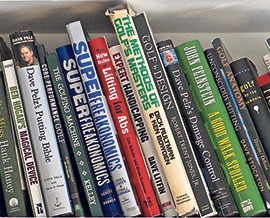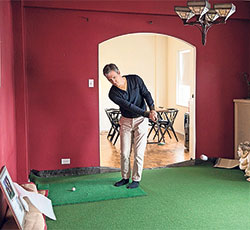‘Freakonomics’ co-author Steven Levitt talks data – and dieting

Simply sign up to the Life & Arts myFT Digest -- delivered directly to your inbox.
When I arrive at Steven Levitt’s three-bedroom flat in the Chicago neighbourhood of Hyde Park, he greets me warmly at the door. And as we walk into his spacious, sparsely furnished living room, I learn he’s a native mid-westerner with a preference for simplicity but not in a fussy minimalist way. “You can tell by looking around that I don’t really care about stuff,” he says matter-of-factly.
An abstract painting created by an elephant hangs above the fireplace. It consists of black, brown and blue splodges that pan out into streaks towards the edges. Levitt bought it at an auction at his children’s school. “No one was bidding on it and I felt sorry for the elephant,” he says, before mentioning that all of the furniture in the apartment was bought during a two-hour trip to a Room & Board store with his four children. “It was amazingly efficient,” he says.
Levitt, 46, is co-author, with Stephen J Dubner, of the popular Freakonomics books. Since the first one was published almost nine years ago, the economics professor at the University of Chicago has received floods of emails from people asking him to solve their often complex problems. “We created this mythology around ourselves that whatever your problem is, you hand it to the Freakonomics guys and we’ll solve it, which is not true. We were really thinking about hanging up our spurs and not writing a third book.”
Then they hit on the idea to write a how-to of sorts focused on the way Levitt thinks. Aptly named Think Like a Freak, the book zeros in on the pair’s innovative approach to solving big problems. “The first step,” says Levitt, “is to be able to say ‘I don’t know’.” It seems pretty obvious but having worked with businesses through his consultancy firm, The Greatest Good, he was surprised at how taboo this admission was.
“Everyone fakes like they know the answers even when no one possibly could. It’s a sign of shame to admit you don’t know. You can’t learn until you admit you don’t know anything. There is so little I know. It’s not that I can’t figure things out, it’s just the world is a big place with a lot of complexity. It takes effort to learn things.”
Some of the firm’s projects have included helping non-profit groups such as Smile Train (which helps to fix cleft palates in children) be more intelligent about how and whom they solicit for fundraising. Through his work consulting, Levitt received an economics lesson of his own.
“If people aren’t paying you for what you do, they don’t value you. It’s a really strange thing that you have to charge really high prices or people don’t listen to what you have to say. You could be giving the exact same advice, but the more you charge, the more people are going to follow your advice.”

Levitt moved into the apartment last June after separating from his wife and, as he walks into the spacious, well-appointed kitchen, he admits he didn’t use the oven for the first six months. He has since only cooked meat, mostly steak, as part of a low-carb diet. “I have a friend who’s very anti-carb and just to humour him, I cut them out about a year ago. Not eating carbs gave me something to do, it’s kind of a challenge.” While food, in and of itself, doesn’t particularly excite him, he raves about the steak and eggs at Salonica, a local Greek diner. “I could eat that twice a day,” he says, and then notes that he has done so on several occasions.
Passion and curiosity are two qualities he hopes to instil in his children, who range in age from 10 to 14. “A lot of parents emphasise achievement, but I think that’s the wrong approach. Almost every kid knows how to read and do math, but when I look at my students, what separates the truly exceptional ones is a combination of creativity and excitement for life,” he says. “Very early on I made my goal not to have my kids be really good readers or really good at math but instead to try to instil in them this idea of thinking and excitement of pursuing what they love.”
It took Levitt a while to realise he had always thought like an economist. As a freshman at Harvard, he ended up in the introductory economics class because everyone else was taking it, but the lectures felt painfully obvious to him. “It was like the professor was putting a name on all the things that I always thought.” When he found out how confusing his friends found it, he had an epiphany. “It dawned on me that even though I didn’t know it, I had always thought like an economist, and it was the only thing I was good at.”

From a young age, Levitt says, he has been drawn to the path of least resistance, which seems strange coming from someone who voluntarily pursued a PhD at MIT. “That was a rude awakening because I was so totally and completely unprepared and behind all of my peers in terms of knowing math and being good at what most economists do – complicated statistics and those kinds of metrics. I was forced for the first time to think a little bit and to make a real choice: I’m going to follow the topics, projects and problems that I love and not worry about whether anyone else likes them.”
This liberated Levitt to pursue the edges of life that fascinated him. He was watching the US television reality show Cops at the time, often on his couch while eating dinner, and realised he was interested in the relationship between police and crime, which in turn led to him studying and publishing on the economics of terrorism, drink-driving, car seats, cheating, sumo, drug gangs and prostitutes.
From his living room windows, which overlook the expansive mid-rise skyline of Chicago’s South Side, it is possible to see the corners where he gathered data on prostitution, a project that he remembers challenging his expectations. “As an upper-middle class American, you don’t really think of prostitution as being a margin, but for these women living in the inner city, it was about getting by . . . it was an economic issue.” He remembers learning that many women with jobs would take up the oldest profession for three holiday weekends (July 4, Memorial day and Labor day) because demand drove the price particularly high.
Levitt is as inquisitive as any philosopher, seeking the answers to the same big questions of existence and the function of society, but his only belief is in the data. By letting data drive his questions, he often receives answers that tear the fabric of conventional wisdom.
Steven Levitt and Stephen J Dubner will be in conversation in London on May 27. ft-live.com/thinklikeafreak
——————————————-
Favourite thing

“My first official act when I moved in was to convert this to a golf room,” Levitt says of the former formal dining room. The putting green grass carpet helps create the illusion of a course. “My thought was to put up a net, but I haven’t yet. Golf balls aren’t that hard,” he says, explaining that he often chips balls directly at the wall. The one problem is a low-hanging chandelier. “I need to get rid of the lamp. It’s a problem for airing shots.” The room is also furnished with two sculptures: one a sumo wrestler (a gift from a friend), the other a ballerina sculpted by his daughter, Lily.
This article has been amended since publication to reflect the correct name of Levitt’s consultancy firm, The Greatest Good
——————————————-
Letter in response to this article:
Money well spent / From Ms Sabine Liebherr
Comments